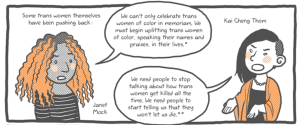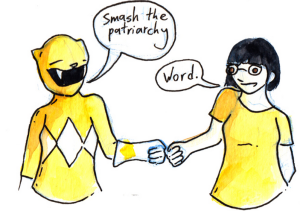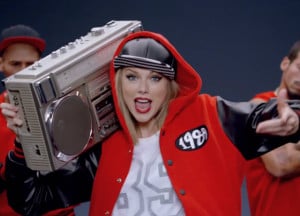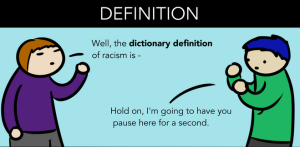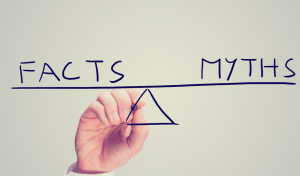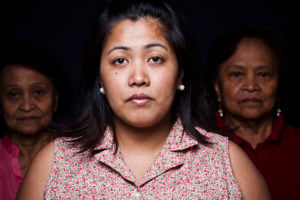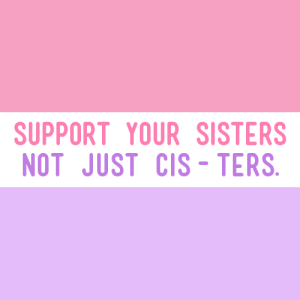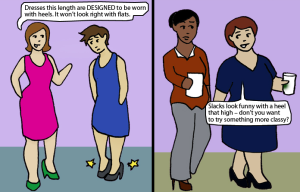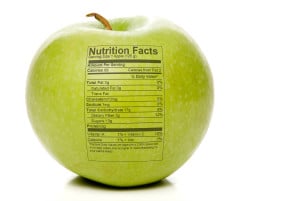
Source: Interactive Biology
Read the next three words and then close your eyes and picture what they mean (and then open your eyes and keep reading, of course!):
Health.
Fitness.
And nutrition.
What did you see in your mind’s eye? Was that person “healthy-looking?”
What I’m really asking is: Was the person you were picturing lean or thin?
The reason I ask is because I want to make very clear and tangible to you that we, as a culture, have been socialized to visualize certain words – like “health” or “fitness” – through a very skewed lens.
We don’t see fat bodies in Lulus or Nikes. We see them on the news, shot from the torso down, hands clasping processed meats and bags of chips, with a ticker beneath running the sober headline: “Fat is a disease.”
You see, while fat shame is sometimes about disgust and morality, more often than not, it’s couched as “genuine” “concern” about health – because “fat is a burden on our health care system.”
Which seems to give concerned citizens the right to start fat-shaming anyone whose body seems to symbolize ill health – even if there is nothing unhealthy about that body at all.
The troubling thing is that fat isn’t the burden on the health care system. Disease is a burden on the health care system. And not all fat people have diseases that burden the health care system.
Moreover, if we’re so concerned about the health care system, then instead of blaming and shaming individual bodies, why don’t we focus on the systems that are causing the diseases that are contributing to the burden?
And, no, I’m not here to make the case that there are no unhealthy fat people (just as I’m not going to make the case that all thin people are healthy).
But I would like to raise the issue that maybe, just maybe, we’re focusing on the wrong things in our health and fitness debate and actually making the problem worse.
How?
1. Fat-Shaming Fixates on an Erroneous Definition of Health
Before we talk about systemic issues, I want to raise the point that, while the idiom “picture of health” gets thrown around, there is no such thing as a single picture of health. Because “health” is an intangible thing – it’s a “condition.”
Health is simply the state of being free from disease.
You can do this in a large body or a small body. And while, yes, there is correlation between obesity and many of the modern-day plagues that seem to be cropping up in body after body, there’s also correlation between overweight and a lower risk for all-cause mortality.
The problem is that the real conversation isn’t about “fatness” or “thinness.”
If you have access to quality food, maintain a healthy level of movement, and are properly educated on how to maintain a manageable balance of food, movement, sleep, and stress, then your body is going to land at whatever size it feels most comfortable being, genetics and hormones notwithstanding.
We focus on bodies that look and are “normally” fat and automatically assume that those bodies are also diseased.
While spending our energy and resources looking at exteriors instead of focusing on what’s happening on the interior is certainly a lot easier (after all, it’s not like the average layperson is going to go around giving physicals before trolling someone on Twitter, just in case), it’s still energy misspent.
You can’t always know what’s going on inside by looking at someone’s exterior. Except maybe with the chicken pox. Or advanced stages of leprosy. Then you can be pretty certain.
Otherwise, you may think you know, based on what the media has told you are the “warning signs” for disease, but you don’t.
There are plenty of perfectly healthy “fat” bodies. There are plenty of perfectly unhealthy thin bodies too.
(Take it from a former eating disorder sufferer. I had a six pack, and everyone wanted to know how I got such a “perfect” physique. Little did they know that I also wasn’t getting my period.)
So until you have all of the information (and most likely you never will), how can you shame someone for their exterior?
Let’s start from the assumption that not everybody can or will be thin – naturally.
2. Fat-Shaming Comes from a Place of Privilege
How close do you live to a Whole Foods Market? Do you have to think twice about your wallet before getting in line at the juice place near your pilates studio? Can you afford a Vitamix or a second freezer for the meat from your grass-fed cow share?
Fat-shame usually assumes that every person has access to resources and are abusing their privilege by over-consuming, or that they are making the conscious choice to consume specific resources known to cause or contribute to health problems.
Fat-shame puts the blame on individual persons.
It says, “You knew better than to be fat. You had the knowledge and the ability to make different decisions. Your fat is a marker of your ‘bad’ choices. And now that I’ve told you that you’re bad, you must change. If you don’t, that makes you doubly bad!”
This implies that the person in question has the ability to make different choices.
And as much as I understand the impulse to espouse the Horatio-Alger pull-yourself-up-by-the-bootstraps philosophy that motivates individuals to change their socio-economic situations, the problem remains that, in this world, with the social constructs in place as they are right now, not everyone can rise to the top – whether that’s due to lack of resources, lack of education, or both.
Fact: We live in a country that has food deserts.
That’s not just a place where there’s no Trader Joe’s within driving distance. A food desert is defined by the USDA as “an urban neighborhood or rural town without ready access to fresh, healthy, and affordable food.”
As in, you’re lucky if you can get a salad at a McDonald’s. As in, your “healthy” choices are limited by what’s available to you, and what’s available to you isn’t healthy.
Moreover, not everyone actually has access to nutrition awareness.
People may “know” that they probably shouldn’t be picking up Oreos at the local convenience store, but they don’t know what else they could be doing instead.
And before we make the argument that it’s the individual’s responsibility to go out and self-educate, some people have not been empowered to know that’s even an option.
It’s hard to recognize a lack of privilege through a privileged lens.
And just because you may be able to spend hours on your smartphone listening to your favorite health podcasters argue about the relative merits of gluten-free whole grains, it may be hard to imagine that some people have to travel for miles to a local library to borrow the Internet, let alone even know where to start, what with the ten million contradictory health and fitness blogs that pit juice cleanses against low carb diets in angry screeds filled with fear-mongering health claims.
If you were told tomorrow that everything you knew about fitness and nutrition was wrong, and you had one hour to go and make a decision about how to fix your health, develop a meal plan for a family on a fixed income, and schedule in a form of exercise that doesn’t cost you money to partake in or learn how to do while working a night shift and raising a kid, then you might consider singing a different tune.
To be clear, this is not to suggest that all fat people are uneducated, disempowered, or making poor choices about food. Remember: there are thin, unhealthy bodies as a result of lack of resources, too.
And before you make the argument that even educated people are making “bad choices,” consider the fact that even those who do have access to education or resources are confused and unsure about what they can do to improve their health because we exist in a culture composed of corrupt systems that influence or manipulate our choices – sometimes without our knowledge.
3. Fat-Shaming Doesn’t Fix a Broken System of Nutrition Advertising and Education
Did you know that Kraft Singles (a cheese “product”) was just awarded (read: bought) a seal of approval for children’s nutrition from the Academy of Nutrition and Dietetics?
Or that dietitians are paid to promote mini cans of Coca-Cola as a healthy alternative?
Or that the US dietary guidelines (for example) have been pretty much wrong for the last 45 years?
I get it. Nutrition is a slippery science. Most scientists can’t even agree on what’s actually healthy for human beings to consume (and in what quantities and at what time), let alone laypeople in the grocery store.
But the problem isn’t that we don’t know what we don’t know. It’s that even the people on the front line – like doctors, dietitians, and nutritionists – know better, but take money to miseducate us anyway (and then blame us for not knowing better).
So here’s a fact that may startle you (or perhaps may not surprise you at all): Our nutrition education has been bought by Coca-Cola. And Pepsico. And Kelloggs. And General Mills. And I’m not speaking from beneath a tinfoil hat. It’s really true.
Moreover, after big companies manipulate the government to get low-nutrition crops – like GM corn, dwarf wheat, and soy, along with factory farmed meats – subsidized by the government, they’re also able to manipulate nutrition labeling so that they appear to be within recommended guidelines, when they’re actually serving empty calories and health-harming chemicals instead of food to our children (and our adults).
I don’t think anyone is arguing the fact that if you have the education to understand that Flaming Cheetos are not a “smart snack” food for your children, you should probably not be feeding them to your children; however, many people actually don’t know better.
And when they start to educate themselves about one label, manufacturers and corporate entities figure out how to create new labels or leverage others to misdirect and misinform – and make sales, even when the products are actually potentially harmful to our overall wellbeing.
And this is not to make excuses for those who don’t have the education, but rather a plea: Instead of getting upset at individuals who make choices to eat certain foods based on what they do or do not understand about them, let’s take this to the Academy of Nutrition and Dietetics.
Let’s take this to the USDA. Let’s go to the schools that are educating our doctors and nutritionists and petition to have sponsored education taken off the menu. Let’s get our food manufacturers to own up to their marketing ploys.
And let’s get some regulation on “recommendations” like “Smart Snacks” and on labels like “all natural,” so that people can make choices about what to eat without influence from advertisers.
And while we’re at it, let’s petition to get this stuff off the shelves in the first place – if you’re so concerned about peoples’ health, that is.
4. Fat-Shaming Puts the Blame on ‘Wrong’ Bodies Instead of Wrong Systems
We’ve made ill health an individual issue. We’ve given people the wrong tools and the wrong education, and we’ve made it harder for them to make good choices, let alone access them.
We’ve made “fat” a moral issue instead of a reflection of the systems that are exploiting (and oppressing!) each and every one of us.
Fat is a straw man argument. It’s a classic misdirection that keeps us bickering in the comments on YouTube and Instagram instead of petitioning Washington to stop subsidizing Big Ag (that is, “Big Agriculture,” or corporate farming) and start supporting small farmers.
It’s a faulty argument that breeds disgust in our neighbors instead of distrust in our leaders and influencers.
If you have the know-how and the resources, you have the privilege of taking your health into your own hands. You may – or may not – lose weight in the process of improving your diet or increasing your fitness. That is neither here nor there.
Let’s stop celebrating the individual victories as the only way to win the war on our health and instead channel that energy into using that privilege to support people who are suffering from diabetes, heart disease, or any number of ailments that may be associated with consumption of over-processed foods.
Let’s stop supporting the institutions that are making it harder for us to make healthy choices without having to pay a price.
If you’re so concerned with other people’s health, the least you can do is help make it possible for them to be healthy. At any size.
[do_widget id=”text-101″]
Kaila Prins is a Contributing Writer for Everyday Feminism and a health coach who works with women who are ready to stop “recovering” from disordered eating and start “discovering” their true identities. Kaila’s health coaching services, as well as her blog, can be found at In My Skinny Genes, and she hosts a weekly podcast called Finding Our Hunger. She also counts characters and not calories on Twitter @performingwoman.
Search our 3000+ articles!
Read our articles about:
Our online racial justice training
Used by hundreds of universities, non-profits, and businesses.
Click to learn more





